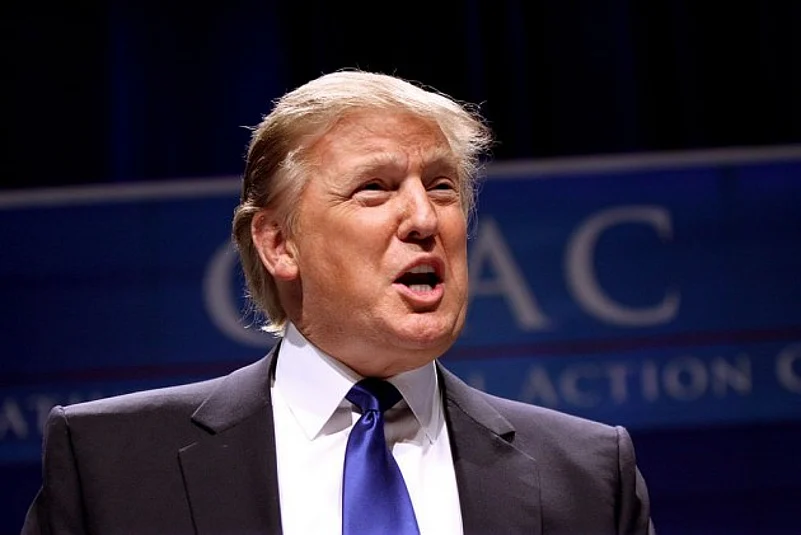President Donald Trump swept into office nearly four years ago as an outsider who promised to get things done quickly on behalf of the American people through sheer force of will and unrivalled knowledge about the art of the deal.
He has checked off some items on his to-do list.
Trump pushed through the most significant overhaul of the U.S. tax system since President Ronald Reagan. Trump, as he said he would, tilted the Supreme Court further to the right with confirmation of two conservative justices and likely a third, Amy Coney Barrett, in the coming days. His promise to get tough on illegal immigration has resulted in a surge in migrant apprehensions at the U.S.-Mexico border.
But Trump has also faced the same hard truth that each of his White House predecessors learned: Governing is rarely easy.
A look at some of the president's unfinished business as he asks voters for a second term in the White House:
HEALTH CARE
Trump has managed to undermine President Barack Obama's health care law, but has fallen far short of his promise to repeal and replace the Affordable Care Act.
His administration has managed to dismantle parts of the law. Enrollment periods have been shortened, some subsidies were ended and the individual mandate -- the fine for people without health insurance -- has been eliminated.
Trump says he's still focused on replacing them with something “much better and much less expensive.” He said in an interview with CBS' “60 Minutes” that “it will be so good” if the Supreme Court puts an end to “Obamacare” when the justices hear challenges to it next month.
The number of uninsured Americans has risen under Trump's watch.
According to Census Bureau data released last month, nearly 30 million people in the U.S. lacked coverage at some point during 2019, about 1 million more than in the previous year.
“ENDLESS WARS”
Trump has made only modest progress toward meeting his 2016 pledge to bring home all troops from what he calls America's “endless wars.” When Trump took over the White House, the number of U.S. forces in Afghanistan stood at about 8,400, and there were about 6,800 troops in Iraq.
Within a year, the number of troops in Afghanistan climbed to about 15,000.
Trump approved commanders' requests for additional troops to reverse setbacks in the training of Afghan forces, fight an increasingly dangerous Islamic State group and put enough pressure on the Taliban to force it to the peace table.
In February, the U.S. and the Taliban signed an agreement that calls for the eventual complete withdrawal of U.S. forces from Afghanistan.
With an eye toward the election, Trump has accelerated his push to bring troops home, teasing that all U.S. troops could be out of Afghanistan by the end of the year.
Pentagon officials said the number of troops in Afghanistan will drop to 4,500 in November. But defense officials insist there are no plans to have all troops home from Afghanistan by the end of the year. U.S. officials also say there currently is no approved plan to reduce the number to 2,500 by early next year. The officials were not authorized to publicly discuss internal deliberations and spoke on condition of anonymity.
In Iraq, the number of U.S. troops has dipped from about 5,000 to roughly 3,000, although officials say the number fluctuates higher as units rotate in and out.
THE WALL
During his 2016 primary run, Trump sought to mark his ground as a hard-line immigration enforcer who would build “a great, great wall on our southern border.”
“And I will make Mexico pay for that wall,” Trump said as he launched his run for the White House in June 2015. “Mark my words.” Nearly four years later, Trump still has work to do completing his wall and much that has been completed has been paid by U.S. taxpayers despite promises otherwise.
The president's administration has promised to build 450 miles by the end of this year and has so far built 371. Trump has replaced hundreds of miles of old, worn-out barriers, meant only to stop cars, with tall, 30-foot fencing that is much harder to get over and impedes wildlife from crossing the border. Conservationists in Arizona, where a bulk of the building has taken place, say the new wall is detrimental to wildlife and the surrounding ecosystems.
Mexico has steadfastly refused to pay for the border wall, though Trump earlier this year suggested that the wall is being paid, in part, by remittances from Mexican immigrants working in the U.S.
To date, the money is coming from the U.S. Treasury, meaning today's taxpayers and the future ones who will inherit the federal debt. To the extent any people who came into the U.S. illegally are kicking in for the wall, it's because they're working and paying taxes like other workers.
Trump also freed up $3.6 billion for the wall last year by diverting money from military construction projects as well as $2.5 billion from approved counterdrug spending.
MIDEAST PEACE
Early in his presidency, Trump expressed confidence that his administration could broker a long-term peace agreement between Israel and the Palestinians.
“We will get it done,” Trump declared in May 2017. He put his son-in-law and senior adviser Jared Kushner in charge.
Trump moved the U.S. Embassy in Israel from Tel Aviv to Jerusalem, a step that was cheered by Israelis and the president's evangelical Christian supporters in the U.S. but angered Palestinian leaders.

























